Seminario de Investigadores [1er Semestre 2020]

El seminario de INVESTIGADORES se cancela hasta nuevo aviso.
Se llevará a cabo una recalendarización del mismo.
Marzo 17, 2020
Sala de Seminarios Fernando Salmerón, IIFs - UNAM
Miércoles 12.00 hrs.
ENERO.2020
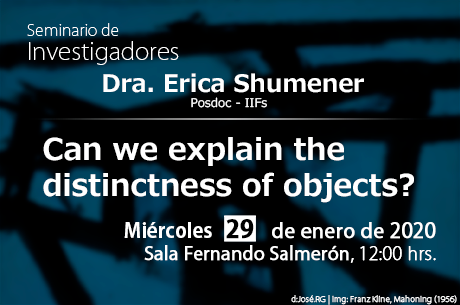
29 Dra. Erica Shumener [Posdoc-IIFs]
Can we explain the distinctness of objects?
FEBRERO 2020
5 Mariana Gardella [Posdoc- IIFs]
"No hables y dirás mi nombre" (Ant. gr. 14. 22). El valor filosófico de los enigmas en Grecia antigua
12 Rei Terada [University of California, Irvine]
Impasse as a Figure of Political Space
19 Quentin Ruyant [Posdoc-IIFs]
True Griceanism about Scientific Representation
Abstract
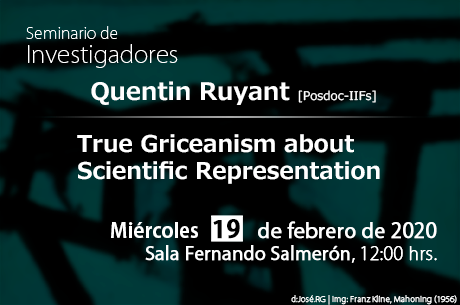 The constitution question of scientific representation is concerned about what makes a source of representation (for example a theoretical model) a representation of its target.
The constitution question of scientific representation is concerned about what makes a source of representation (for example a theoretical model) a representation of its target.
Callender and Cohen have proposed a deflationist answer to this question, to the effect that mere stipulation by the user would be enough for the representation relation to take place. They claim that their account is the result of applying a “Gricean strategy”, taking inspiration from Grice’s reduction of linguistic meaning to mental states. This account has been criticised for not making a distinction between symbolic and epistemic representation and not taking into account the communal aspects of scientific representation. In this presentation, I will argue that these criticisms would not apply if Grice’s actual strategy were properly employed. I will present a truly Gricean account of scientific representation that does not fall prey to the same criticisms. The main novelty of this account is a distinction between contextual representational use and general representational status, analogous to the distinction between utterance meaning and expression meaning in philosophy of language.
26 Noell Birondo [Wichita State University]
Practical Wisdom and Coercive Technai
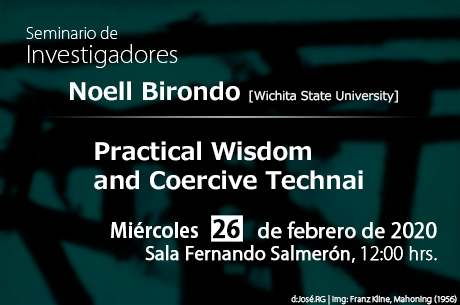 Abstract
Abstract
Many philosophers have insisted that the possession of an Aristotelian virtue cannot be accurately understood as the possession of a practical skill (Greek: technê). This is because the following four cases, at least, tell against the possession of a moral virtue but not against the possession of a skill: (1) the agent is not motivated at all to exercise the capacity, (2) she is so motivated, but only half-heartedly, (3) she acts as she does for the wrong reason, that is, for an inappropriate end, and (4) she intentionally acts wrongly with respect to the relevant capacity. In this paper I argue that cases (1)–(4) should not lead us to deny that virtue is a kind of skill. Instead, they should encourage us to appreciate a more robust (and independently plausible) conception of skill, one whose plausibility can be obstructed by the pervasiveness of coercive forms of technê, both in Aristotle’s world and in ours.
MARZO 2020
4 Santiago Echeverri [IIFs]
"Pensamientos en primera persona"
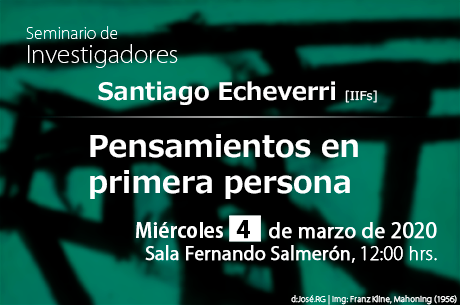 Resumen
Resumen
Según la concepción tradicional, el concepto “yo” es un indéxico mental. No obstante, algunos críticos han argumentado que el concepto “yo” es en realidad un nombre mental dotado de un rol funcional bastante peculiar. A esta posición la denominaré la concepción del “yo” como nombre. En esta charla presentaré un argumento explicativo en contra de la concepción del “yo” como nombre y a favor de la concepción indéxica tradicional. Mi punto de partida es la hipótesis según la cual el concepto “yo” es un dispositivo que permite integrar información. A continuación, muestro que la concepción indéxica tradicional ofrece una mejor explicación de la integración de información que la concepción del “yo” como nombre. Al final, muestro cómo la concepción indéxica tradicional puede bloquear varias objeciones influyentes y esbozo algunas implicaciones para el debate del indéxico esencial.
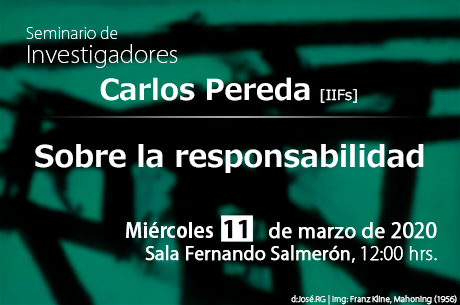
11 Carlos Pereda [IIFs]
"Sobre la responsabilidad"
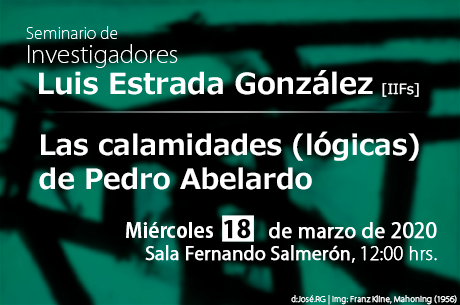
18 Luis Estrada [IIFs]
"Las calamidades (lógicas) de Pedro Abelardo"
25 José Antonio Chamizo [Cambio de Adscripción F. Química]
Los límites de la sustancia química. De la pureza a la inmaterialidad
Seminario de Investigadores (2o Semestre 2019) »
Aviso de privacidad
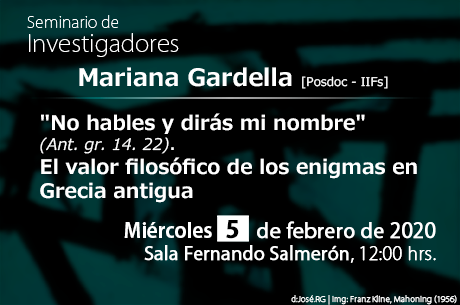
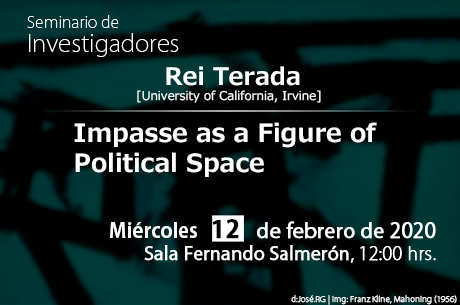
 Texto
Texto


 Circuito Maestro Mario de la Cueva s/n, Ciudad Universitaria, C.P. 04510, Coyoacán México, CDMX
Circuito Maestro Mario de la Cueva s/n, Ciudad Universitaria, C.P. 04510, Coyoacán México, CDMX